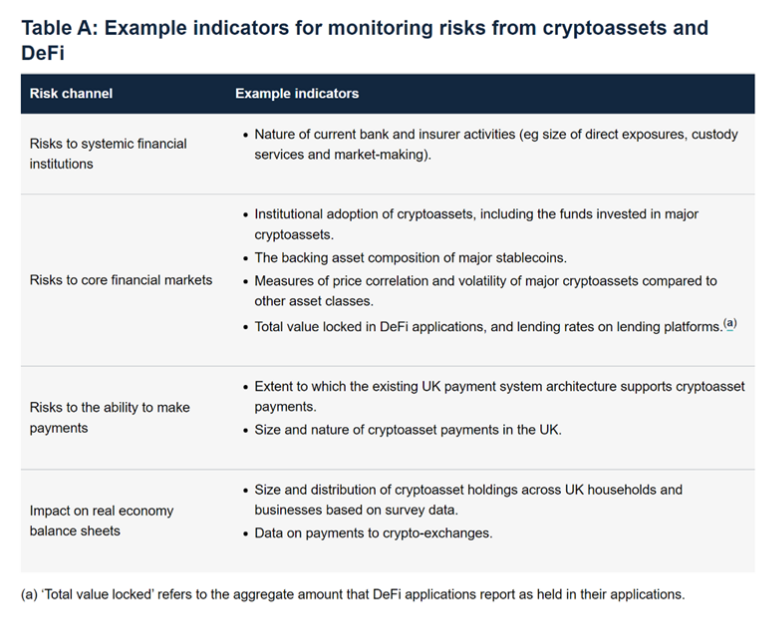On 24 March 2022, the Financial Policy Committee (FPC) of the U.K.’s central bank, the Bank of England (BoE), published a document titled: “Financial Stability in Focus: Cryptoassets and decentralised finance”.
In it, the BoE sets out its views on cryptocurrencies (which it calls “cryptoassets”) and considers the potential financial stability implications and risks from the crypto sector. For now, however, the BoE is of the view that:
“direct risks to the stability of the UK financial system from cryptoassets and DeFi are currently limited, reflecting their limited size and interconnectedness with the wider financial system.”
Nonetheless, the BoE notes that as the crypto sector grows in importance, risks could potentially arise from interlinkages between cryptoassets and the traditional financial sector. They may also be new forms of financial and operational risk for financial institutions. In any case, the BoE is concerned about the growth in activity outside of the existing regulatory perimeter and recognizes the challenges inherent in regulating new forms of entities and business models.
Therefore, the BoE will (through the FPC) seek to ensure that risks to financial stability arising from cryptoassets and Decentralized Finance (DeFi) markets and activities are mitigated. The BoE said:
“if the pace of growth seen in recent years continues, and as these assets become more interconnected with the wider financial system, cryptoassets and DeFi will present financial stability risks.”
Financial stability implications of cryptoassets and associated markets
The BoE set out the following as its views on the financial stability implications of cryptoassets.
- The technology underpinning cryptoassets has the potential to reshape activity in the traditional financial sector.
- Innovation in cryptoassets and the technology underpinning them could bring several benefits.
- The mitigation of financial stability risks from cryptoassets and associated markets is essential to ensuring the benefits from new technologies can be realized sustainably.
- The BoE has identified the key risk channels that could stem from cryptoassets and associated markets.
Risks to U.K. financial stability
The BoE believes that risks to financial stability may manifest in the cryptoasset industry thereby creating risks to systemic financial institutions and core financial markets. The BoE also expects risks to emanate from future mainstream use of cryptoassets for payments. Similarly, it sees a potential impact on real economy balance sheets if leveraged retail holdings of cryptoassets were to grow significantly.
The BoE has identified the following as the key channels through which these risks could affect financial stability:
- Risks to systemic financial institutions
- Risks to core financial markets
- Risks to the ability to make payments
- Impact on real economy balance sheets
- Risks to systemic financial institutions
Although the BoE notes that direct involvement in cryptoasset and associated markets by U.K. banks has been limited to date, further involvement could increase the risk of financial losses and operational disruption.
Further, the growth of stablecoins for payments could increase the role of non-banks in the financial system, and opportunities for regulatory arbitrage could arise.
The publication notes that involvement in cryptoassets and associated markets by insurers is currently very limited.
- Risks to core financial markets
The increasing popularity of cryptoassets amongst traditional financial institutions and institutional investors means that cryptoassets are starting to become integrated into the portfolios of institutional investors.
This means that contagion to core financial markets from cryptoassets and associated markets (which have been limited to date) may arise as they become embedded in institutional investors’ portfolios.
In the context of stablecoins, there is concern a fire sale of backing assets could disrupt the functioning of certain markets if they were to grow materially. And in any event, the composition of stablecoin backing assets may in some cases not be sufficient to cope with mass redemptions, which could create risks for the wider financial system.
- Risks from use for payments
The BoE sees the potential for stablecoins to play an increasingly important role in payments, especially in view of the potential for a stablecoin to launch and scale up rapidly. Since a stablecoin has the potential to become a systemic payment system relatively quickly, the BoE believes that public confidence in money and payments could be undermined if a systemic stablecoin used for payments fails to meet its obligations.
That is, in the event that a systemic stablecoin were to fail to honour its obligations or suffer an operational failure such as a breach of privacy, this could undermine public confidence in money and payments, and in the financial system more broadly.
- Impact on real economy balance sheets
The BoE notes that the risk from cryptoassets to household spending and business investment is currently limited. However, it cautions that:
“If retail holdings of cryptoassets were to grow significantly – especially if funded by debt – a sharp correction in valuations could have a negative impact on consumer spending or their ability to service other debt.”
Similarly, were U.K. businesses to significantly increase their holdings of cryptoassets, then losses from cryptoassets could create direct losses to businesses thereby reducing investment in the wider economy.
Indicators for monitoring risks from cryptoassets and DeFi
Given its concerns, the BoE has set out sample indicators that it will use to monitor the evolution of risks from cryptoassets and DeFi and assess financial stability risks. See below the BoE’s table of indicators (source: Financial Stability in Focus: Cryptoassets and decentralised finance).

In Conclusion…
- The BoE believes that the technology underpinning cryptoassets has the potential to reshape activity in the traditional financial sector, and could bring a number of benefits.
- However, mitigating the financial stability risks posed by cryptoassets and DeFi is critical to ensuring that the benefits of emerging technologies can be realized sustainably.
- The key channels through which these risks could affect financial stability include risks to systemic financial institutions, core financial markets, and payments systems.
- There could also be an impact on real economy balance sheets if there are significant retail holdings of cryptoassets funded by debt.
- The BoE plans to continue to monitor developments in cryptoassets and DeFi with a view to ensuring the resilience of the U.K.’s financial system to systemic risks that may arise.
If you would like to read more articles like this, follow DeFi Planet on Twitter, LinkedIn, Facebook, and Instagram.




















